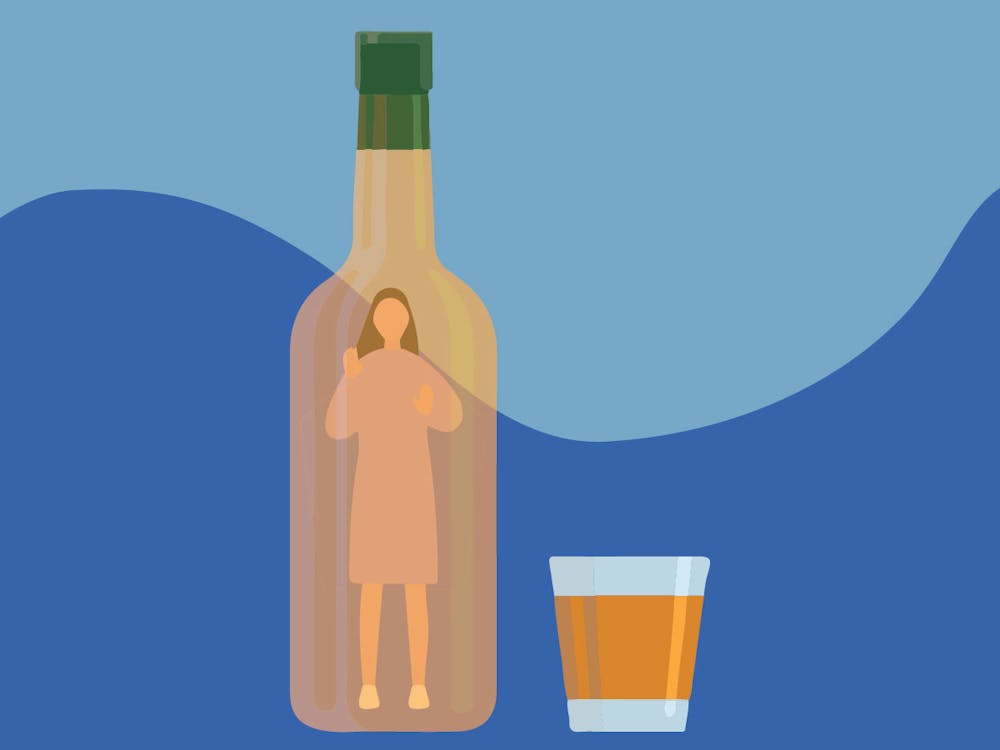Alcoholism does not conform to a stereotype. Alcohol misuse can affect anyone.
Robert F. Leeman, a UF College of Health and Human Performance associate professor, said although people may have an image of an older man with liver problems, there is no true image of what a person with alcohol use disorder can look like.
While many may expect older people to be affected, data from the National Institute on Alcohol Abuse and Alcoholism shows those aged 18 to 25 have the highest rate of alcohol use disorder.
Unlike older adults, he said, young adults don’t usually present major physical health issues, like liver function problems, until later in life. This is partially why people don’t perceive young people to struggle with addiction in the same way as elders.
“A young adult who drinks heavily could face withdrawal, but on average, that's something that probably is going to take a long drinking history to get,” he said.
But someone doesn’t have to suffer from these issues to be considered an addict.
Burton Burt, owner of Recovery Awareness counseling center in Gainesville, said aside from the recognizable health signs, like having a fatty liver or cirrhosis, there are other warning signs of addiction. These include failing to complete daily tasks, using while at work and drinking earlier in the day.
Additional signs of a problem are constantly craving to drink, underperforming in school and jobs, damaging relationships due to alcohol use and repetitively losing consciousness while drinking or “blacking out,” Leeman said.
Burt also believes college culture sets students up for failure.
“You're in a culture that promotes exploration on dangerous levels, in some cases, without regard for the consequences,” he said.
Leeman said that, although it’s true for most college towns, UF’s close proximity to local bars makes students more susceptible to drinking.
Midtown’s UF Plaza, which houses Grog House Grill, Fat Daddy’s and JJ’s Tavern, is located across the street from campus. This can make it easy for anyone, especially those living on campus, to go out drinking.
While Marina Sachs, a 27-year-old graduate student who identifies as a sober alcoholic, said Greek life and the bars’ proximity to campus encourage this dangerous lifestyle, they believe UF itself plays a role.
“I don't think that there are adequate resources for young people on campus, if we're just talking about UF campus, to acknowledge and address addiction,” they said. “I just haven't seen it.”
While Sachs said UF’s lack of resources on campus is terrifying, they also attributed students’ reluctance to seek out help to the perpetual stigma associated with alcoholism.
“The stigma emerges from this really incorrect notion that if you are drinking too much, or if you can't stop using drugs … it's because you don't know how to control it,” they said. “And the thing about addiction is like that's the point; we can't control it.”
Even the idea of being too young to be an addict stigmatizes the entire topic, Sachs said. From their experience, it made them feel like a “failure” when they wanted to get help.
Leeman said clinicians and researchers have even begun using terms such as “alcohol misuse” and “alcohol use disorder” because, from their expertise, there exists a certain level of stigma associated with the term “alcoholic.”
But Sachs takes issue with these newer terms.
“The fact that it is so kind of medically determined, oftentimes by white cis-het[ero] professionals who aren't addicts themselves, feels like it's an externally placed marker of a group of people who didn't get a chance to determine that name,” they said.
They also believe this term, like other terms used against marginalized communities, can be reclaimed and used to empower others.
While Leeman said the 18-25 age group is most susceptible to struggle with alcohol misuse, he also pointed to the period of “maturing out,” during which most young adults will slow down the heavy drinking on their own.
“We want to try to predict the folks who are less likely to mature out, but we don't focus all on that, because even folks who down the road will mature out, they could face some negative consequences in the here and now from drinking,” he said.
For additional support, you can contact Alcoholics Anonymous for Gainesville at (352) 372-8091 or on their website.
Contact Luigi at lbencosme@alligator.org
Luigi is a third-year media production, management, and technology major at UF and is currently one of the multimedia editors for the Alligator. Prior to his editor position, Luigi was a staff writer under the Avenue as well as the podcast producer for Rowdy Magazine. In his free time, he likes to read up and investigate the most obscure fun facts that would interest no one else.






